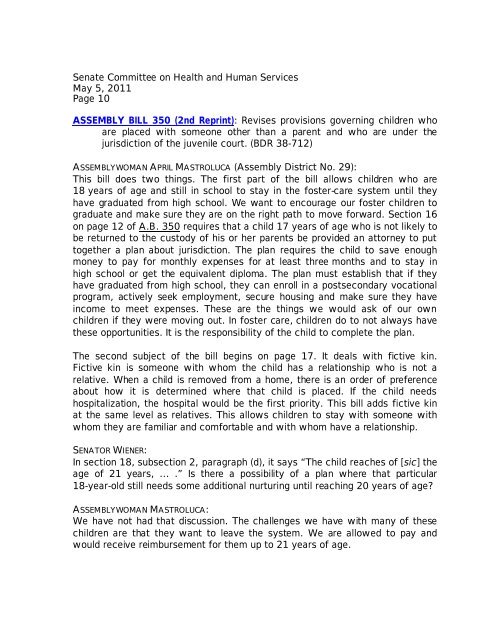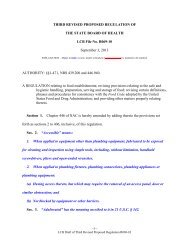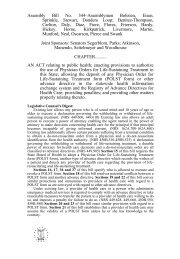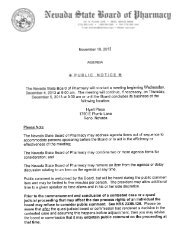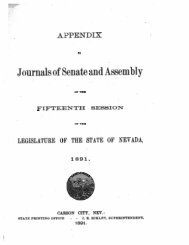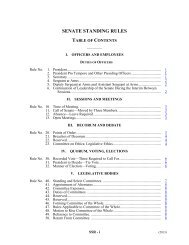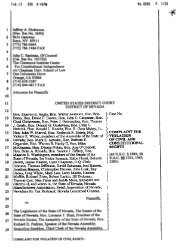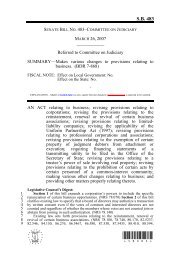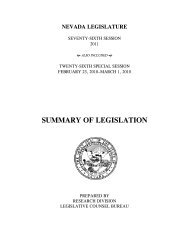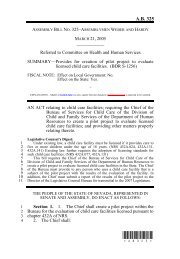SENATE COMMITTEE MINUTES - Nevada Legislature
SENATE COMMITTEE MINUTES - Nevada Legislature
SENATE COMMITTEE MINUTES - Nevada Legislature
You also want an ePaper? Increase the reach of your titles
YUMPU automatically turns print PDFs into web optimized ePapers that Google loves.
Senate Committee on Health and Human Services<br />
May 5, 2011<br />
Page 10<br />
ASSEMBLY BILL 350 (2nd Reprint): Revises provisions governing children who<br />
are placed with someone other than a parent and who are under the<br />
jurisdiction of the juvenile court. (BDR 38-712)<br />
ASSEMBLYWOMAN APRIL MASTROLUCA (Assembly District No. 29):<br />
This bill does two things. The first part of the bill allows children who are<br />
18 years of age and still in school to stay in the foster-care system until they<br />
have graduated from high school. We want to encourage our foster children to<br />
graduate and make sure they are on the right path to move forward. Section 16<br />
on page 12 of A.B. 350 requires that a child 17 years of age who is not likely to<br />
be returned to the custody of his or her parents be provided an attorney to put<br />
together a plan about jurisdiction. The plan requires the child to save enough<br />
money to pay for monthly expenses for at least three months and to stay in<br />
high school or get the equivalent diploma. The plan must establish that if they<br />
have graduated from high school, they can enroll in a postsecondary vocational<br />
program, actively seek employment, secure housing and make sure they have<br />
income to meet expenses. These are the things we would ask of our own<br />
children if they were moving out. In foster care, children do to not always have<br />
these opportunities. It is the responsibility of the child to complete the plan.<br />
The second subject of the bill begins on page 17. It deals with fictive kin.<br />
Fictive kin is someone with whom the child has a relationship who is not a<br />
relative. When a child is removed from a home, there is an order of preference<br />
about how it is determined where that child is placed. If the child needs<br />
hospitalization, the hospital would be the first priority. This bill adds fictive kin<br />
at the same level as relatives. This allows children to stay with someone with<br />
whom they are familiar and comfortable and with whom have a relationship.<br />
SENATOR WIENER:<br />
In section 18, subsection 2, paragraph (d), it says “The child reaches of [sic] the<br />
age of 21 years, … .” Is there a possibility of a plan where that particular<br />
18-year-old still needs some additional nurturing until reaching 20 years of age?<br />
ASSEMBLYWOMAN MASTROLUCA:<br />
We have not had that discussion. The challenges we have with many of these<br />
children are that they want to leave the system. We are allowed to pay and<br />
would receive reimbursement for them up to 21 years of age.


